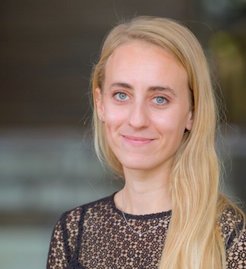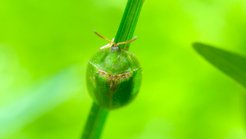Humboldt Fellow Inès Pons sheds light on bacterial symbioses
Funding for research project on how bacteria help leaf beetles digest their meals
It is estimated that one in five animals is a beetle. With more than 500,000 species known to science, most of them are herbivores. Typically, these beetles digest the components of plant cells with the help of enzymes. This is not the case with the tortoise beetles. Indeed, their genome does not contain a blueprint for such enzymes, so it has a real handicap with plant fibers that are particularly difficult to digest.
Symbiosis with bacteria as a significant survival benefit

Through symbiosis with a bacterium, however, it is able to process even long-chain polysaccharides, such as pectins. "In our research group, the enzyme activity in tortoise beetles with and without symbiotic bacteria was investigated. It was found that thistle tortoise beetles were unable to break down pectins without the external help of so-called symbionts. “These beetles had significantly lower survival rates than a comparison group of beetles that relied on assistance from the bacterium," Pons explains. Purpose relationships like these have a very special influence on the further ecological and evolutionary success of herbivorous leaf beetles, according to Pons. That is why such symbioses are of such importance in evolutionary biology research.
Inès Pons will therefore devote herself to comparable questions, especially during her Alexander von Humboldt fellowship. She wants to find out to what extent such symbioses can induce a niche expansion of these beetles. To her, the findings of the research group in which the postdoc is working are therefore of particular importance. "The Humboldt Fellowship allows me independence and resources in my further research plans. In Hassan Salem's working group at the Max Planck Institute for Developmental Biology, I have been able to find the ideal environment for this," Inès Pons affirms.
A vibrant research community at the forefront of microbiome research

Humboldtian Inès Pons will also be able to benefit from special programs and collaborations with the Max Planck Society and the Max Planck Institute for Developmental Biology long after her research stay in Tübingen. Above all, the alumni networks and the possibility of return fellowships enable young researchers like her to develop their own research careers. "In my opinion, such programs, as well as the support of my team in Tübingen, are central to being able not only to work creatively and innovatively, but also to plan my own career in a goal-oriented way."
The Max Planck Institute for Developmental Biology supports promising scientists with various programs, including the Alexander von Humboldt Fellowship. With support from the Humboldt Foundation, Inès Pons joins a vibrant research community that is at the forefront of microbiome research.













